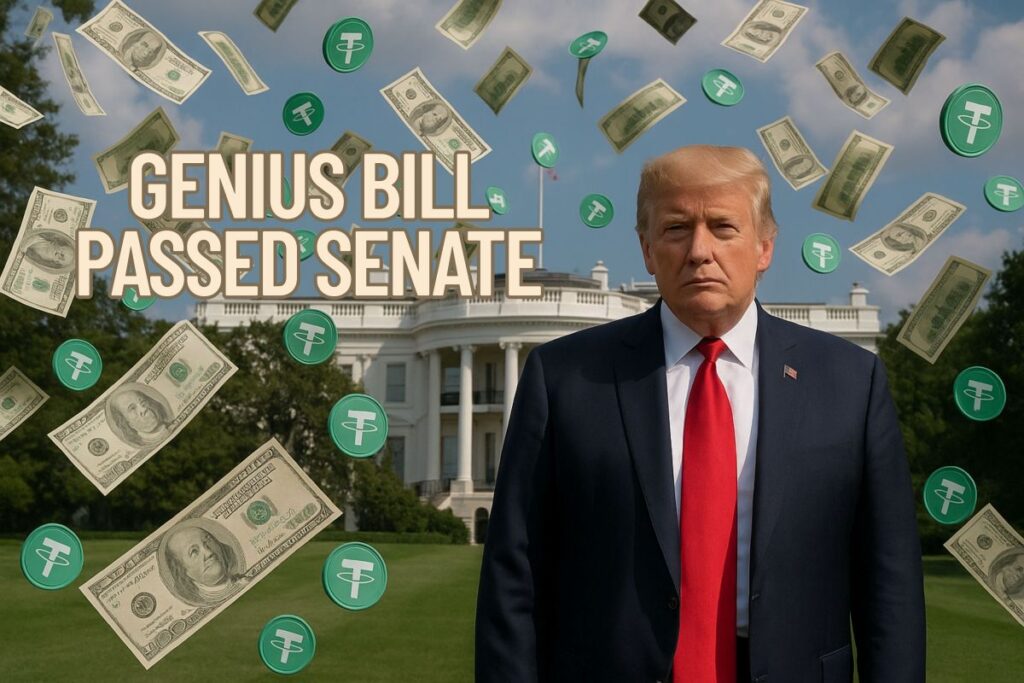In the ever-evolving world of digital currencies, the intersection of innovation and regulation has become more pronounced than ever. With the US Senate’s recent legislative efforts, the balance between security, transparency, and privacy is under the microscope. As the landscape shifts towards more structured oversight, individuals and investors find themselves navigating new rules and potential impacts on their digital assets. Understanding this dynamic environment is crucial for anyone invested in or curious about the future of cryptocurrencies.
How the GENIUS Act Redefines Stablecoin Regulation
Introducing the GENIUS Act: A New Era of Stablecoin Oversight
The Guaranteeing Essential National Infrastructure Using Stablecoins (GENIUS) Act marks a pivotal moment in the regulation of digital currencies. Its passage through the Senate with a 68-30 vote reflects a significant push towards more robust oversight within the cryptocurrency industry. As this legislation moves closer to becoming law, its implications offer both promise and controversy.
Should the House align with the Senate’s version, the act will head to the President’s desk for final approval. This would position it as one of the first comprehensive steps towards integrating digital assets into the formal financial system.
Key Provisions of the GENIUS Act
Under the GENIUS Act, stablecoin issuance will be restricted to licensed institutions. Those with a market capitalization exceeding $10 billion must seek regulation under a comptroller or submit applications for conditional approval through appropriate federal channels. Smaller entities will operate under state-sanctioned frameworks.
Stablecoins must maintain a one-to-one backing with high-quality liquid assets, including Treasury bills and bonds. This mandate aims to protect investors by ensuring transparency and trust in the backing of these digital assets.
Additional requirements include mandatory monthly reserve disclosures, anti-money laundering compliance, and prohibition on yield-bearing stablecoins. The Commodity Futures Trading Commission (CFTC) will also gain limited enforcement power within the spot market, further tightening controls.
Privacy Concerns and Political Ramifications
While supporters claim the GENIUS Act could foster global confidence in US-backed digital assets and potentially cut transaction costs significantly, there is considerable opposition. Critics, including Senator Elizabeth Warren, have raised concerns about potential abuses of power, increased government surveillance, and financial pathways that could be exploited by illicit entities.
Initial legislative hurdles stemmed from worries about national security and potential loopholes, particularly with foreign investments in US-based exchanges. These accusations fueled debates and resulted in stricter provisions for ethical governance and financial transparency among officials involved in stablecoin dealings.
Embracing Decentralization with Privacy-Oriented Solutions
In light of these regulatory developments, decentralized solutions like Best Wallet have emerged as crucial tools for maintaining privacy and control over digital assets. Best Wallet provides a non-custodial service that empowers users with complete ownership over their cryptocurrencies, free from governmental and third-party encroachments.
Protecting Your Digital Assets with Best Wallet
Best Wallet offers a user-friendly platform that supports over 1,000 digital assets across major networks. Its mobile application facilitates seamless crypto transactions without the need for Know Your Customer (KYC) verification, thus preserving user anonymity. With advanced security measures like Fireblocks MPC technology, users can rest assured their assets remain protected from vulnerabilities and hacks.
Moreover, Best Wallet’s Cross-Chain Swap feature and planned expansions promise greater versatility and accessibility for crypto enthusiasts.
The Future of Crypto with Best Wallet’s Innovations
At the heart of the Best Wallet ecosystem is the $BEST token, which offers reduced transaction fees, staking opportunities, and governance rights within the platform. Future developments, such as the introduction of Best Card, a forthcoming crypto debit card, aim to further integrate digital assets into everyday spending, heralding a more crypto-inclusive future.
Investment Prospects Amidst Stablecoin Reform
The GENIUS Act signifies a promising yet challenging shift in how digital currencies are perceived and utilized. While regulation may enhance trust and legitimacy, it also introduces potential limitations and privacy concerns. For those prioritizing autonomy in their digital dealings, solutions like Best Wallet present viable alternatives.
This article is not intended as financial advice. Investing in cryptocurrencies involves inherent risks, and individuals should conduct thorough research and consider their financial capacity before participating.
Frequently Asked Questions About Fantom and Crypto Investments
Is Fantom (FTM) a good long-term investment?
Fantom (FTM) is recognized for its efficient architecture and low transaction costs, making it a popular choice among investors. Nonetheless, any investment decision should be based on careful examination of market trends, technological developments, and competitive landscape.
What are the implications of the GENIUS Act for stablecoin users?
The GENIUS Act introduces stringent regulations for stablecoin issuance, ensuring transparency and security. Users can expect more reliable stablecoin offerings, though enhanced oversight may also lead to increased scrutiny and reduced anonymity.
How does Best Wallet protect my digital assets?
Best Wallet utilizes cutting-edge security protocols, such as Fireblocks MPC technology, to safeguard users’ assets against breaches and hacks. By providing non-custodial services, it ensures complete user control over private keys and eliminates the need for third-party intermediaries.
Are there any risks associated with using crypto wallets like Best Wallet?
While crypto wallets like Best Wallet offer increased privacy and autonomy, they also require users to manage their own security measures, such as safeguarding private keys. Failure to do so could result in loss of access to funds.

